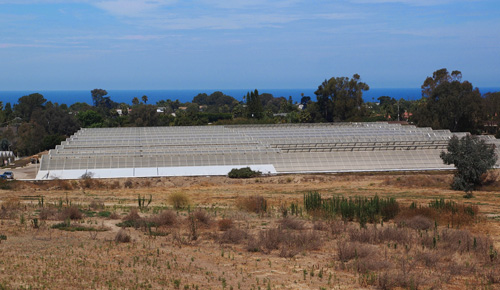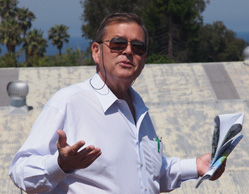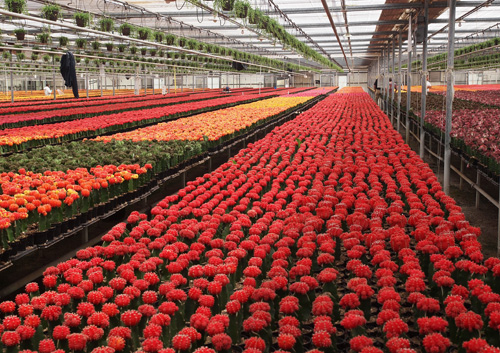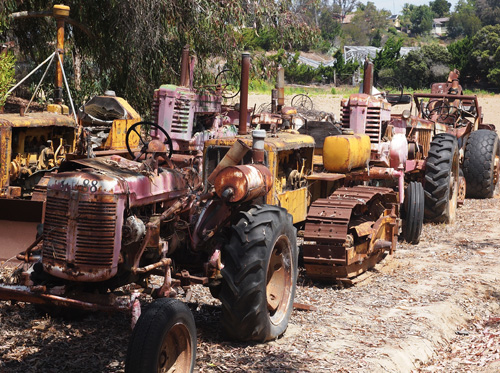
Story by Donald H. Harrison; photos by Herb Targum
ENCINITAS, California — Plans are emerging for how the Leichtag Foundation will use its recently purchased 67 1/2-acre Ecke Ranch at 441 Saxony Road for public benefit. The foundation, named for the late philanthropists Toni and Lee Leichtag, announced last April the purchase of the Ecke Family-owned ranch which is known best for the poinsettias it ships around the world. That real estate transaction, for an undisclosed purchase price, is now in escrow.

Jim Farley, president and chief executive officer of the Leichtag Foundation, said he envisions a major collaboration with the San Diego Botanic Garden, which occupies 37 1/2 acres on the Ecke property’s southeast border and which, through Farley’s good offices, already has a collaborative relationship with the Jerusalem Botanical Gardens.
In addition, Farley said while conducting San Diego Jewish World on a tour of the property, there is likely to be a food farm to supply fruits and vegetables to a variety of non-profit agencies of San Diego County whose mission is to feed the hungry. These include the Hand-Up Pantry operated by Jewish Family Service; San Diego Food Bank; Feeding America, Interfaith Community Shelters, and the Community Resource Center.
In association with this food farm, he said, will be a Food Justice Fellowship in which fellows will participate in an 18-month program to study and make recommendations on how society can effectively combat hunger. Part of their fellowship would entail working with the recipient food agencies.
The food farm and the joint project with San Diego Botanic Garden are “A-list” ideas, said Farley, meaning that they have progressed to a point of serious discussions and planning with community partners. Other ideas still percolating, but not so far along in the development process, include a kosher wine vineyard, an olive grove and press, a 1,500-seat amphitheatre, a hiking trail linking Quail Gardens Drive and Saxony Road; a day camp, a conference center, and a fruit and vegetable stand.
The Ecke family owns flower fields in Carlsbad as well as major flower-growing operations in Guatemala and other countries. They have a research and development facility on the Ecke Ranch, which will be relocated somewhere else. Much of the 850,000 square feet in greenhouses will also be removed, according to Farley. However, many buildings will remain, including the Ecke family home designed during the 1930s by architect Lillian Rice, whose buildings are prominent and historic features of the nearby community of Rancho Santa Fe. The fate has not been decided of a long row of antique tractors and farm vehicles near the back of the property.



The property rises 60 feet in elevation from its entrance on Saxony Road to a hillside at the back of the property near Quail Gardens Drive from which one can enjoy some beautiful “green flash” ocean vistas.
Farley reviewed what other kinds of facilities are in the neighborhood. To the west of the property are the Silverado Senior Living facility, specializing in Alzheimer patients’ care, as well as the Leichtag campus of Seacrest Village Retirement Communities. The Seacrest Village campus, operated by the non-profit San Diego Hebrew Home for the Aged, was another of the philanthropic projects that Leichtag family members supported in their vision to strengthen Jewish communal content in the North County coastal portion of San Diego County. Across the street on Saxony Road is the Magdalena Ecke YMCA, which serves 22,000 members and to which the Ecke family were important contributors.
On the back side of the property, in addition to a portion of the San Diego Botanic Garden, are the city-owned, interactive Hamilton Children’s Garden; the San Dieguito Heritage Museum; and a proposed science center to be operated by the Encinitas Union Elementary School District on a 10-acre parcel.
Because Farley once served as chairman of the board of the San Diego Botanic Garden, joint planning with that organization is furthest along. The Leichtag Foundation underwrote an exchange program bringing together top personnel of the San Diego Botanic Garden and the Jerusalem Botanical Gardens to trade ideas about horticulture and methodologies.
This “gro-mance” was highlighted in a recent issue of Public Garden. Julian Duval, SDBG president, and Oren Ben-Yosef, JBG director-general, announced that as a result of the collaboration, reciprocal membership in the two gardens had been agreed upon. Ben-Yosef said he hopes to develop a children’s garden inspired by some of the ideas he saw in San Diego, and also was impressed by SDBG’s displays of water-wise plants. Duval, meanwhile, said he liked the way the Jerusalem Botanical Garden offers trilingual signage, in English, Hebrew and Arabic, and said the San Diego Botanic Garden would do well to have a similar English-Spanish bilingual sign program. Additionally, both gardens have been developing special outreach programs, providing serenity and tranquility for veterans, members of the military, and their families
Ben-Yosef said that the Jerusalem Botanical Garden is interested in developing an area showing North American Desert plants, and how native peoples like California’s Kumeyaay Indians historically utilized them. Meanwhile, San Diego Botanic Garden intends to create a new Eastern Mediterranean Garden, “complete with plants from the Holy Land and explanatory materials for visitors,” Duval said in the Public Garden interview conducted by Sue Surkes of the Jerusalem Botanical Gardens.
With land adjacent to the San Diego Botanic Garden, the Ecke Ranch may be the appropriate place for this Holy Land garden to be constructed, said Farley. What kind of arrangements will be made by the two entities — perhaps a lease, perhaps a far-reaching conservancy arrangement–remains to be worked out.
Farley said that parking for the San Diego Botanic Gardens is an issue, and that some planners have suggested a parking lot on the Ecke property for that purpose. Unfortunately, he said, the location suggested was atop a hill, in one of the prime viewsheds to the ocean. He said he would like to find a way to continue to utilize that land for agricultural purposes, and still find other space for parking. One possibility, he said, may be an underground parking garage, similar to that planned in Balboa Park, with a garden on top.
While there is land available for a kosher vineyard and winery, as well as for an olive grove and press, Farley said the Leichtag Foundation is not in the position to single-handedly fund every good project that might be suggested for the Ecke Ranch land. Such projects require input and capital from visionaries more familiar than he with the intricacies of such operations, he said.
Farley said the Leichtag Foundation is interested in hearing from the public about their ideas for how the former flower ranch might be used. Those with suggestions may contact the Foundation at info@leichtag.org
*
Harrison is editor of San Diego Jewish World, who may be reached at donald.harrison@sdjewishworld.com . Targum is a freelance photographer who may be contacted at htargum@cs.com